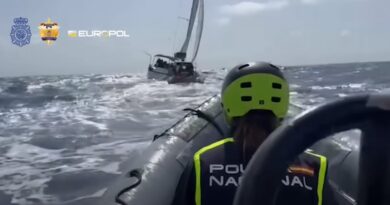The Spanish Civil Guard dismantles in the Basque Country an organization dedicated to the illicit transfer of electronic scrap to countries on the African coast
The Spanish Civil Guard, within the framework of the Hozkailu operation, has dismantled a criminal organization that was dedicated to the illicit transfer of waste of all kinds to various countries on the African continent: Nigeria, Ghana and Equatorial Guinea fundamentally. As a result of the operation, 18 people whose criminal network had been perfectly established in our country for years have been arrested and investigated.
As a result of the work carried out by SEPRONA in terms of cross-border shipments of waste, the researchers detected several fenced plots on the outskirts of the town of Vitoria (Álava) where large amounts of all types of waste were collected in different degrees of conservation, among which tires at the end of their useful life, motor vehicles, gas cylinders, and a large amount of waste electrical and electronic equipment (WEEE) stood out.
After the first investigations, it was found that a group of people of African origin was removed from the legal circuit huge amounts of waste, mainly electrical and electronic, which were collected in different locations in the open, to later bestowed without any type of security in shipping containers for export to the African continent. The waste was declared as second-hand items in order to avoid customs controls and thus be transported to Africa as electronic scrap.
Waste Travels
The organization had established a complex system to avoid customs control.
From the Basque Country, the waste was placed in large shipping containers and transported by road in trucks to the port of Bilbao. At the same time, in a fraudulent way, exit authorizations were formalized through Almería Customs. This decentralization of customs operations made it very difficult for merchandise to be inspected, systematically leaving Bilbao every week without the containers being inspected.
The waste left Spain as second-hand equipment, when in fact it was waste that had not undergone any type of prior transformation. In this way, the benefit of the criminal organization was double, since income was added to the elimination of the expenses derived from waste management. The more than 500,000 kilos of WEEE stand out, due to the polluting gases that most contain inside.
The Civil Guard has carried out seven searches of different commercial companies and ships throughout Spain. The investigation yields results from the last four years, although indications have been obtained that the criminal group has been carrying out these export operations for at least nine years, so the investigation is still open.
From the records carried out, huge amounts of different types of hazardous waste ready to be sent to the African coast were detected. Among the waste detected, the nearly one thousand butane and propane gas cylinders stored in two ships and in two shipping containers are more relevant. Said containers were retained in the port of Bilbao when they were to be loaded onto a ship to leave Spain for Africa.
Environmental Issues
The high generation of waste constitutes a serious environmental problem in modern societies, hence the need for strict regulations that ensure and guarantee proper recycling management.
The World Economic Forum rules that the irresponsible treatment of technological waste causes irreparable damage to people’s health and the environment.
Likewise, the Basel Convention of the United Nations regulates the traffic of hazardous waste between countries and prohibits developed states from sending this waste to developing countries, because they do not have the necessary infrastructure for proper recycling management. However, waste continues to flood countries like Nigeria or India, turning them into authentic technological dumps.
The incorrect management of much of the waste discovered in this operation would lead to the emission of greenhouse gases into the atmosphere that affect the ozone layer. In addition, in the case of vehicles at the end of their useful life, they contain a significant amount of pollutants and hazardous waste that must be managed properly, since the heavy metals that are produced from poor management can reach the food chain. , through rivers and coastal areas.
Collaborations
The investigation has been directed by the Court of Instruction No. 4 of Vitoria-Gasteiz (Álava) and promoted by the Delegate Section of Environment and Urbanism of the Provincial Prosecutor’s Office of Vitoria (Álava).
The operation has had the collaboration of the Tax Agency, the Waste Inspection Body of the Basque Government, the Provincial Councils of Bizkaia and Álava, the Arrigorriaga City Council, the Bizkaia Fire Brigade, SOS Deiak and the Local Police of Vitoria among other.
EUROPOL and INTERPOL have also collaborated in the analysis of communications and in the strategic analysis of documentation to find possible relationships with other countries, currency movements and shipment information; as well as with the collaboration of the General Subdirectorate of Circular Economy of the MITERD (Ministry for Ecological Transition and the Demographic Challenge) in joint work teams aimed at studying the illegality of shipments.




